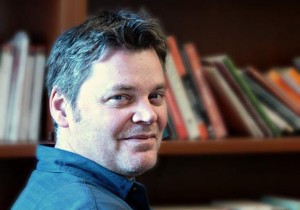 Mark Kingwell, professor of philosophy at the University of Toronto, has just delivered his thoughts on “Does reading have a future?” for the Ottawa Citizen, distilling his conclusions from a keynote speech on ‘The Future of Reading’ for the 40th anniversary AGM of the Writers’ Union of Canada. “A noted Canadian philosopher” (which is probably why his piece is appearing in the Ottawa Citizen), Kingwell brings the hermetic hermeneutics of po-mo critical theory to bear on developments in e-reading and comes away—no great surprise—with the conclusion that “the current debates about the future of reading are merely the welcome death throes of individualism.”
Mark Kingwell, professor of philosophy at the University of Toronto, has just delivered his thoughts on “Does reading have a future?” for the Ottawa Citizen, distilling his conclusions from a keynote speech on ‘The Future of Reading’ for the 40th anniversary AGM of the Writers’ Union of Canada. “A noted Canadian philosopher” (which is probably why his piece is appearing in the Ottawa Citizen), Kingwell brings the hermetic hermeneutics of po-mo critical theory to bear on developments in e-reading and comes away—no great surprise—with the conclusion that “the current debates about the future of reading are merely the welcome death throes of individualism.”

Well, really. Kingwell’s critique starts off rhetorically posing the sort of questions familiar to TeleRead readers: “When will ebook sales render hard copies obsolete? Will print magazines and newspapers survive?” But he insists that: “these of-the-moment technology-driven concerns do not get us closer to the heart of reading, which is a matter of human consciousness.” And furthermore, “current debates are overwhelmingly premised on the false idea that “reading” in its highest or best form means reading books, most often novels of the middle-class condition that have dominated the modern age,” he continues.”The specific concern for the future of the bound-page book should be seen for what it is: a form of fond special pleading.”
Kingwell then holds up the straw man of Samuel Richardson’s “Pamela” (a story so blatantly hypocritical even for its own day that Henry Fielding produced the brilliantly titled “Shamela” to show it up) to criticize the novel for allowing “the process noted by Marx in which a ‘sentimental veil’ of ‘human interest’ descends over the economic realities of class, marriage, property and procreation.” Through much of what Jürgen Habermas styles “empty postmodernist talk,” he claims that fears of desensitizing Internet use miss the fundamentally narcissistic, desensitizing character of the bourgeois novel itself. “Reading is precisely the foundation of their subtle psychic violence,” he claims of George Orwell’s torturers or Ray Bradbury’s book-burning firemen.
Kingwell quotes George Orwell’s “Nineteen-Eighty-Four,” but he omits to cite the essay where Orwell dwelt on just such themes, his 1946 essay on The Prevention of Literature, which comes out strident and urgent against anything like Kingwell’s arguments. “The immediate enemies of truthfulness, and hence of freedom of thought, are the press lords, the film magnates, and the bureaucrats, but that on a long view the weakening of the desire for liberty among the intellectuals themselves is the most serious symptom of all,” Orwell writes, and continues: “prose literature has reached its highest levels in periods of democracy and free speculation …
Prose literature as we know it is the product of rationalism, of the Protestant centuries, of the autonomous individual.”
And interestingly, Orwell, not Kingwell, touches most nearly on how the literature of a post-individualist society might look, with contours visible in both Kingwell’s cultural New Jerusalem and modern media:
“Imagination—even consciousness, so far as possible—would be eliminated from the process of writing. Books would be planned in their broad lines by bureaucrats, and would pass through so many hands that when finished they would be no more an individual product than a Ford car at the end of the assembly line. It goes without saying that anything so produced would be rubbish; but anything that was not rubbish would endanger the structure of the state.”
(And thanks to U.S. copyright laws, the Wikipedia entry on The Prevention of Literature has to link to a text in Russia.)
Kingwell opines that: “the modern novel is so closely associated with a bourgeois form of existence, a mode of consciousness that we rightly ought to usher off the historical stage,” but I don’t see any signs of this happening, least of all as Kingwell fails to provide a historical mechanism. So I won’t hold my breath. Reading has been around a lot longer than anything remotely resembling a bourgeoisie, let alone bourgeois individualism: I assume it will outlive critical theory too.































